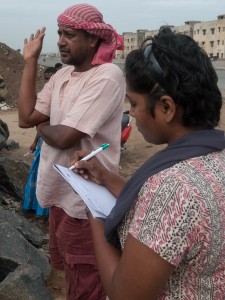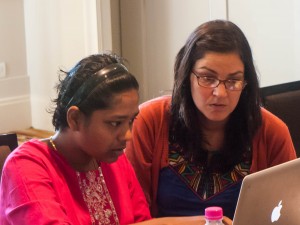Journalists@Work: Pramila Krishnan
Pramila Modachur Krishnan is a senior reporter at the Deccan Chronicle, an English-language daily in Chennai, the capital of India’s Tamil Nadu state. Pramila’s parents are both farmers, and she was the first in her family to get a university education; she has both a bachelor’s and master’s degree. Now 27, she’s especially interested in reporting about the environment and issues facing women and children. In 2013, she took part in a DW Akademie workshop on environmental reporting in Chennai. Her pluck, resourcefulness and dedication convinced her trainers to recommend she attend the recent UN climate conference in Warsaw. onMedia asked her a few questions about her chosen career.
Why did you decide to become a journalist?
I wanted to be in a job that would provide me the opportunity to contribute to society. And I wanted to learn new things and not get bored by doing the same thing throughout my life. I want every day to be an exciting one and that happens in journalism.
What did your parents and/or friends say when you decided to become a journalist?
My parents are farmers and I was the first person in my family to get a college education. I decided not to take run-of-the-mill courses. When I learned about journalism and communication studies, I thought this would be a good fit. My mother encouraged me as she always believed that I should study what I like and not what others want. But others in the family, including my father, stressed that I should get married since that was the custom in many families. My friends doubted I would get a job.
Do reporters have a good reputation in India?
Yes, particularly women journalists, who are in the limelight now. Several media houses have increased the number of women journalists in the last few years.
What do you like most about your job?
I am learning and contributing to the society. I’m happy when I report about an issue and the government or voluntary organizations react and problems are set right. I am hugely satisfied when people whom I have not even met call me to say thank you for a story which I’ve published and which impacted their lives.
What do you dislike most about your job?
Sometimes I am forced to deliver an incomplete story because of deadlines. But I enjoy my work, so I don’t have many complaints.
What was the most difficult story you have covered?
I worked on an investigative report on how elderly people are killed by their own families. In the south of Tamil Nadu there is an age-old traditional practice under which grown-up children conduct a ritual named “Thalaikoothal,” which involves giving sick elders an oil bath and feeding tender coconut water to them to kill them. I visited the villages and met people who had killed their parents. I met quacks who took money and killed elders with lethal injections. I risked my life posing as the granddaughter seeking help in killing her grandfather. After the story was published, it created ripples across the country and the government came up with a mechanism to stop the murders. Now self-help groups have been formed to protect vulnerable elderly people.
Is there a story that you have covered that has particularly affected you?
The story about the murders of elderly people affected me personally. In covering the story, I saw the problems of senior citizens who could well be considered disabled people. They lose their eyesight, hearing, mobility, and ability to think clearly. I understood that I have a grandfather but didn’t spend much time with him. That story changed things. Recently I published a short story book penned by my grandfather. I encouraged him to read books and write stories. Now, I have become a resource person for many elder groups and help them organize events.
How do you feel you are developing as a journalist and advancing along your career path?
I have widened my perspective from a beat reporter to a senior journalist who can cover topics ranging from social issues, the environment, politics and education. I’m also able to lead media campaigns. For example, my “Green Chronicle” initiative in my newspaper featuring stories on e-waste created new awareness. Through the campaign, three tons of e-waste were collected for safe disposal.
Still, I feel I need training in digital journalism skills and specialized subjects like the environment and health.
You were recently invited by DW Akademie to attend the UN climate change conference in Warsaw. What was the experience like?
I was excited about participating. Covering an international event like that for the first time was thrilling. Thanks to my trainers, I was able to cover it and deliver stories every day for my newspaper.
What did you learn there and how will you use it in your future work?
I was able to break down the science in simple terms for my environment stories. I now understand climate change with a little more clarity than before. Participating in the conference gave me hope that I could specialize in environment reporting.
What kind of equipment do you use in your work?
I use a computer, a camera for photos, voice recorders for interviews, and mobile phone applications like WhatsApp and others for receiving and sending photos and other info from government officials and other voluntary organizations. I use mini-cameras if necessary during investigative reporting.
What are your dreams or goals as a journalist?
In the long term, I want to be an editor and give opportunities to young reporters from rural India. More short terms goals are to learn and update my knowledge in areas like the environment, women and children’s issues, and digital journalism.
Personally, I would love to travel around India in a van to explore and write about people aren’t normally written about. I like to travel, learn new things, meet new people and report previously unreported stories.
Interview: Kyle James





